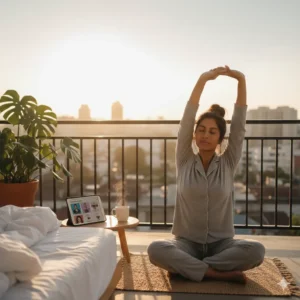“How can I manage stress at home without expensive therapy?” If you’ve ever asked yourself this question, you’re not alone. Life moves fast—work deadlines pile up, family responsibilities never end, and sometimes it feels like your mind just won’t slow down. You don’t need costly therapy sessions to find some peace. Over the years, I’ve tried simple habits and lifestyle tweaks that really help calm the mind, and the best part is—they’re easy to do right from home. In this guide, I’ll walk you through practical, budget-friendly techniques that can help you feel more relaxed, focused, and in control of your day-to-day life.
Managing Stress at Home
Before we dive into techniques, let’s understand why stress management is so important. When left unchecked, stress can:
- Increase anxiety and depression
- Cause headaches, insomnia, and fatigue
- Weaken the immune system
- Raise blood pressure and affect heart health
- Reduce focus, productivity, and motivation
By learning how to manage stress at home without expensive therapy, you give yourself the tools to protect your health, save money, and live more peacefully.
1. Start With Mindfulness and Meditation
Mindfulness simply means being present in the moment without judgment. Meditation is a structured way of practicing mindfulness. Both can calm your racing thoughts and bring a sense of peace.
How to do it at home:
- Sit comfortably, close your eyes, and focus on your breath.
- When your mind wanders, gently bring it back to your breathing.
- Start with just 5 minutes a day and increase gradually.
There are also plenty of free guided meditations on YouTube and apps like Insight Timer that don’t cost a penny.
2. Move Your Body – Exercise for Stress Relief
Exercise is one of the most powerful stress-busters because it releases endorphins (the body’s natural “feel-good” chemicals). You don’t need a gym membership or fancy equipment—just your body and a little space.
Home-friendly exercises include:
- Yoga or stretching routines
- Walking or jogging around your neighborhood
- Dancing to your favorite music
- Quick home workouts (push-ups, squats, planks)
Even 20 minutes a day can improve your mood and help manage stress levels.
3. Build a Healthy Routine
A chaotic lifestyle adds unnecessary stress. Creating a simple daily routine can give your life structure and reduce anxiety.
Key things to include in your routine:
- Regular sleep: Aim for 7–8 hours every night
- Balanced meals: Eat more fresh fruits, vegetables, and whole grains
- Breaks: Step away from screens and rest your eyes and mind
- Hydration: Drink enough water throughout the day
A consistent routine gives your brain a sense of stability, making it easier to handle unexpected challenges.
4. Try Creativity
Creativity is a wonderful outlet for stress. It allows your mind to focus on something enjoyable instead of worries.
Try activities such as:
- Journaling your thoughts and emotions
- Drawing, painting, or adult coloring books
- Playing an instrument or singing
- Cooking or baking a new recipe
You don’t have to be an expert—the point is to enjoy the process and let it refresh your mind.
Also See: 7 Morning Habits That Boost Your Productivity All Day (Lifestyle – Tips)
5. Connect With People You Trust
Isolation often makes stress worse. Talking to a trusted friend, family member, or even joining an online community can make a huge difference.
Ways to connect at home:
- Call or video chat with loved ones
- Share your feelings honestly with someone you trust
- Join supportive online groups or forums
Sometimes, simply being heard is the best therapy.
6. Practice Gratitude Every Day
It’s easy to focus on what’s wrong, but gratitude shifts your attention to what’s good in your life. Research shows that people who practice gratitude regularly have lower stress and better mental health.
Simple ways to practice gratitude:
- Write down 3 things you’re grateful for before bed
- Keep a gratitude journal
- Verbally express thanks to people around you
This habit trains your brain to focus more on positivity than stress.
7. Cut Down Stress Triggers
Not all stress can be avoided, but some can. Identifying and reducing your personal stress triggers will help you take control.
Examples of stress triggers to cut back on:
- Constant negative news or social media scrolling
- Overcommitting to work or social activities
- Living in a cluttered environment
Set healthy boundaries and create a space that feels calm and organized
8. Try Relaxation Techniques
Relaxation techniques work instantly to calm the body and mind.
Techniques you can do at home:
- Deep breathing: Inhale deeply through the nose, exhale slowly through the mouth
- Progressive muscle relaxation: Tense and release each muscle group
- Aromatherapy: Use calming scents like lavender or chamomile
- Listening to calming sounds: Nature sounds, instrumental music, or white noise
These practices can be done in as little as 10 minutes a day.
9. Bring Nature Indoors
Nature has a healing effect on stress. If you can’t go outside often, you can still bring nature to you.
Ideas:
- Keep indoor plants around your living space
- Open windows for natural light and fresh air
- Play recordings of nature sounds like rain or ocean waves
Even small changes like adding a plant on your desk can lift your mood.
10. Balance Work and Personal Life
One of the biggest sources of stress today is work-life imbalance. With many people working from home, the boundaries can blur.
Tips to manage balance:
- Create a dedicated workspace at home
- Stick to fixed working hours whenever possible
- Avoid checking emails late at night
- Schedule downtime just as you schedule meetings
Protecting personal time is just as important as finishing tasks.
When to Seek Professional Help
While these techniques are effective, sometimes stress may be too overwhelming to manage alone. If you notice symptoms like constant anxiety, depression, or insomnia that won’t improve, it’s wise to consult a professional. Many affordable online therapy platforms offer budget-friendly sessions compared to traditional therapy.
Conclusion
Stress is part of life, but it doesn’t have to run your world. By practicing small habits like mindful breathing, light exercise, gratitude, or journaling, you can make a noticeable difference in your mental and physical well-being. The key is consistency: even just a few minutes a day adds up over time. Pick the techniques that feel natural for you, experiment, and make them part of your routine. And remember, if stress ever feels overwhelming, seeking professional guidance is nothing to be ashamed of. Combining self-care with the right support will help you handle life’s challenges with confidence and resilience. You already have the tools—now it’s time to use them to create a calmer, healthier home life.



